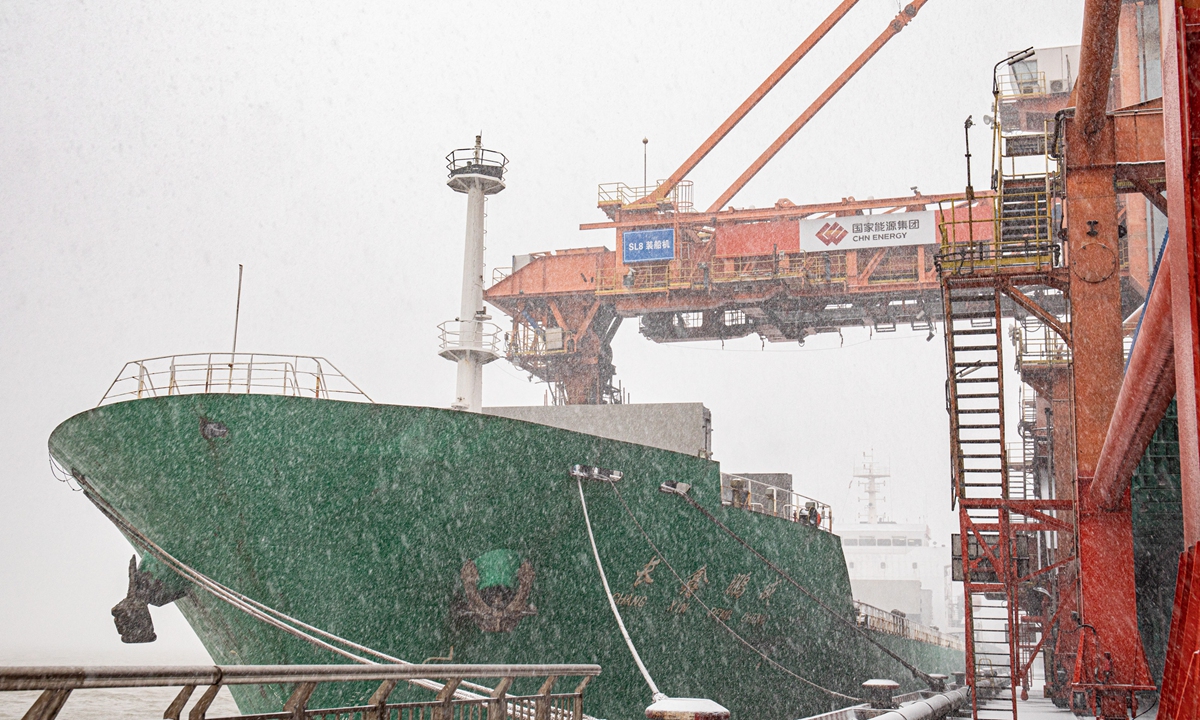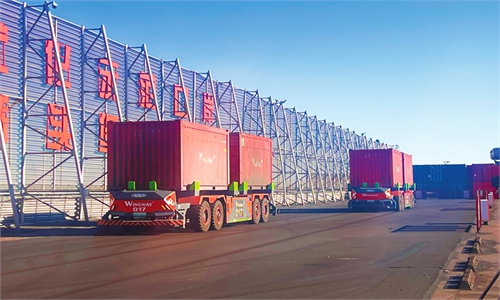
A ship loads thermal coal at Huanghua Port in the city of Cangzhou, North China's Hebei Province on December 14, 2023. Photo: VCG
Government departments and power companies have intensified efforts to address the sudden onset of a cold wave and heavy snowfall across various regions in China over the past week, to ensure stable heating amid the extreme weather.
A cold wave striking the northern parts of China has significantly affected the region. As a result, power supplies are under pressure, and this is expected to intensify as temperatures drop.
It is predicted that during this cold wave, the maximum load of Beijing's power grid will increase by about 19 percent year-on-year, according to media reports.
The low temperatures are testing the maximum load of the power grid and there is a potential for power curbs. In order to ensure that people stay warm, power departments and companies have taken actions to respond.
For example, the electric power emergency command departments in Beijing operate 24 hours a day, and more than 8,000 corresponding electric power personnel are dispatched in case of emergencies, according to State Grid Corp of China on Sunday.
"We are in a critical period to ensure power supplies during the winter peak. Affected by the cold wave, the power load has increased significantly, with the maximum load in the company's operating area reaching 990 million kilowatts, a record high in winter time," State Grid Chairman Xin Bao'an said in an emergency meeting on Saturday, according to the company.
The entire grid is about to enter a new critical stage of ensuring power supply during a cold wave. The situation of fighting against rain, snow and freezing disasters is severe, and the task of ensuring power supply is arduous, Xin noted.
From Sunday to Wednesday, a strong cold wave will persist, moving eastward and southward. Minimum temperatures in northern China and East China's Shandong Province are expected to approach or reach record lows for this period, the China Meteorological Administration reported on Sunday.
Additionally, significant rain and snowfall are anticipated in many southern regions during this time.
With the onset of the heating season and the extreme weather, domestic demand for coal has rapidly increased.
The China Coal Industry Association said that domestic supplies are relatively sufficient, maintaining an overall balance in the market.
Data from the National Bureau of Statistics showed that in November, raw coal production reached 410 million tons, a year-on-year increase of 4.6 percent.
In terms of coal storage, more than 200 million tons of coal were stored in thermal power plants across the country at the end of November, an increase of about 6 million tons from the end of October and an increase of about 28 million tons year-on-year. The coal in storage can last for about 33 days, according to media reports.
Despite the sudden onset of the cold wave, China has made good preparations with a stable supply of coal, a major element of power supply, Lin Boqiang, director of the China Center for Energy Economics Research at Xiamen University, told the Global Times on Sunday.
Coal is still an important energy source for China's power generation sector, partially because coal power generation is mature and stable and it is not affected by extreme weather, Lin said.
China's industrial electricity consumption accounts for close to 70 percent of the total, and residential electricity is always given priority in supply, Lin said.
One of the biggest features of China's energy supply is that most of its energy companies are state-owned, which helps flexibly allocate resources and fully control energy security and price stability, the expert said.
Global Times


